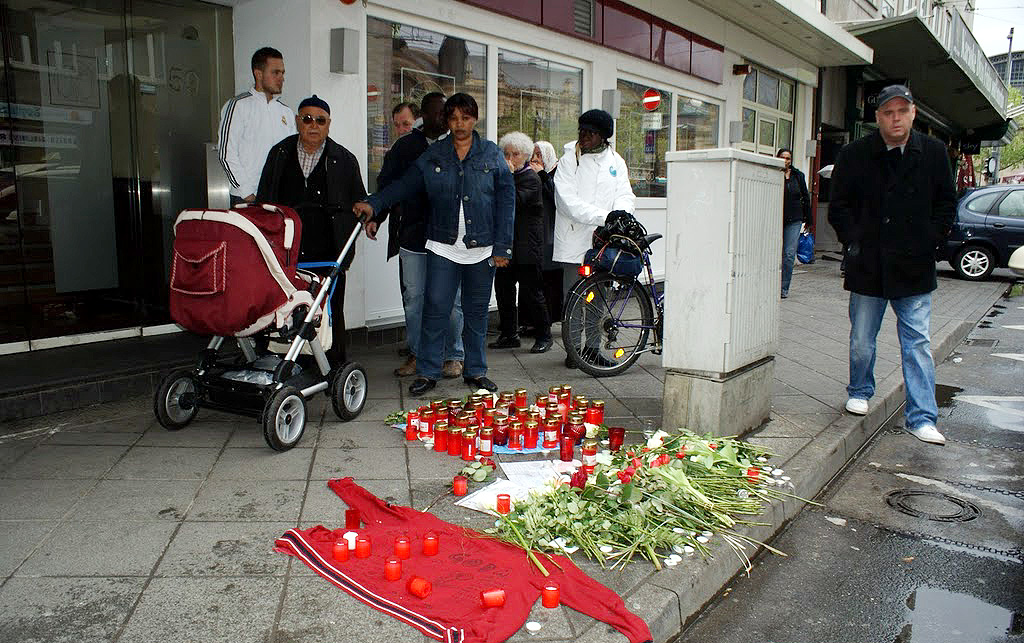If life were a battlefield, Emeka Okoronkwo, killed when he went to the rescue of two molested women could be said to have died a valiant soldier with a bullet in the chest and a gun in his hand. But to Okoronkwo, life was about living in peace and harmony.
Okoronkwo, then 21, sought to protect two Frankfurt women who were being mistreated by two men in the early hours of 2 May 2010, when one of them, a 34-year-old, pulled out a knife and cut short the young Nigerian’s life that was full of promise and dreams. It was a life that positively touched the lives of so many who knew him.
According to a report released by the police, the two men from Eritrea (the other aged 24) had trailed the two women (aged 29 and 43) to a Frankfurt tram station from a discotheque. They cornered the women and made advances to them, which were turned down. So, they started abusing the two women with obscene words.
The two women defended themselves verbally and the Eritreans became increasingly aggressive. One of them spat in the face of one of the women. A chagrined Emeka Okoronkwo, who had quietly observed all this as he waited for his train, intervened on behalf of the women. His audacity and courage to come to the aid of the women infuriated the attackers and in less than a minute the older Eritrean had pulled out a knife and buried it in the left breast of the Nigerian, who collapsed immediately and died an hour later in a Frankfurt hospital.
After stabbing Okoronkwo, the culprit ran away with his accomplice. But they were later arrested following tip-offs from informants who saw the composite sketches released by the police, which had promised a reward of 5,000 euros for information leading to the arrests.
After more than a year of proceedings, a district court in Frankfurt convicted the murderer, identified as Michael W., for manslaughter and jailed him for nine and half years in June 2011. “A person had to die for absolutely no reason this way – and nobody knows why this happened,” the presiding judge at the district court, Bärbel Stock, said in an emotion-laden voice while delivering the verdict.

Okoronkwo came to Germany, aged eight, with his parents to a new home in Langen, south of Frankfurt. He dreamt of becoming a cook in a high-brow hotel. After secondary school in Langen and Sprendlingen, he trained in Frankfurter Kolpinghaus and he did work experience in one of Frankfurt’s big hotels, Ibis. He would have been retained there in the summer of 2010 to complete his apprenticeship as a cook.
Okoronkwo’s death devastated his mother. “My son was a good boy. He very much took care of his 8-year-old younger sister and he was her guard,” she lamented. She said her son wanted to show her the man he had become when he moved out of the house the previous year and took a room in Kolpinghaus, near the famous Konstablerwache in Frankfurt.
READ ALSO: Theodor Michael: ”Develop the courage to struggle and never to give up”
Sania Sayan, a teacher and psychologist at the Kolpinghaus training school, described the late Okoronkwo as an ambitious young man in a press interview after the incident. “He had a vision of what he wanted his life to be,” she added. One trainee remembered his late colleague as a peaceful person who always wanted to give his best in all he did. “We cannot come to terms with his death in such a manner. He was a man of peace and dialogue, and he used words to win his battles. He hated drugs, alcohol and violence,” he said.
Patrick Okoye, then Minister of Information at the Nigerian Embassy, while praising the heroism of Emeka Okoronkwo regretted that civil courage exhibited by his countryman led to tragedy. He said that coming to the defence of the weak was part of the African culture but advised Nigerians to desist from physically intervening in dangerous situations but should rather call the police.
A funeral service for Emeka Okoronkwo was held in Langen on 8 May 2010 and attended by his friends, local officials and representatives of the Nigerian embassy from Berlin.
Speaking at the event, then Mayor Dieter Zimmer of Offenbach, who was visibly “stunned and sad”, said Emeka Okoronkwo had to die because he helped. “He is a hero,” Zimmer added, describing the 21-year-old, who had even been active in an arbitration group, as someone who strictly rejected violence as a means of settling disputes. Unfortunately, his love for peace became his doom, Zimmer concluded.
After the event, the more than 150 people who took part at the funeral service marched through Frankfurt city centre to the scene of the crime where they said prayers and laid down flowers. They wore T-shirts with the inscription: “Wherever you may be, you are and will remain a hero.”
Many German newspapers and magazines reported about the heroic act of Emeka Okoronkwo, recommending his example as the duty of every citizen to aid a compatriot in danger.
Emeka Okoronkwo was buried on 17 May 2010 in Langen.
Sola Jolaoso & Charles Ofoji
 THE AFRICAN COURIER. Reporting Africa and its Diaspora! The African Courier is an international magazine published in Germany to report on Africa and the Diaspora African experience. The first issue of the bimonthly magazine appeared on the newsstands on 15 February 1998. The African Courier is a communication forum for European-African political, economic and cultural exchanges, and a voice for Africa in Europe.
THE AFRICAN COURIER. Reporting Africa and its Diaspora! The African Courier is an international magazine published in Germany to report on Africa and the Diaspora African experience. The first issue of the bimonthly magazine appeared on the newsstands on 15 February 1998. The African Courier is a communication forum for European-African political, economic and cultural exchanges, and a voice for Africa in Europe.

































